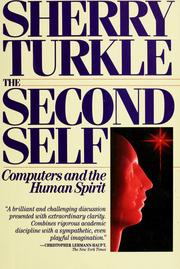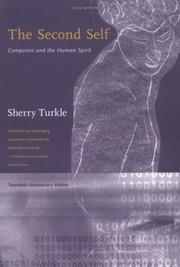| Listing 1 - 10 of 33 | << page >> |
Sort by
|

ISBN: 0671468480 9780671468484 Year: 1984 Publisher: New York (N.Y.) : Simon and Schuster,
Abstract | Keywords | Export | Availability | Bookmark
 Loading...
Loading...Choose an application
- Reference Manager
- EndNote
- RefWorks (Direct export to RefWorks)
Computers --- Electronic data processing --- Ordinateurs --- Informatique --- Psychological aspects --- Aspect psychologique --- Computers. --- Psychological aspects. --- Electronic data processing - Psychological aspects

ISBN: 9780262201681 0262201682 9780262516778 0262516772 Year: 2011 Publisher: Cambridge: MIT Press,
Abstract | Keywords | Export | Availability | Bookmark
 Loading...
Loading...Choose an application
- Reference Manager
- EndNote
- RefWorks (Direct export to RefWorks)
In Evocative Objects, the author collects writings by scientists, humanists, artists, and designers that trace the power of everyday things. These essays reveal objects as emotional and intellectual companions that anchor memory, sustain relationships, and provoke new ideas
Transitional objects (Psychology) --- Objets transitionnels --- MAD-faculty 14 --- objecten --- psychologie --- designtheorie

ISBN: 9780262701112 9780262257107 0262701111 0262257106 142374649X 9781423746492 1282097067 9786612097065 0262250675 Year: 2005 Publisher: Cambridge (Mass.): MIT Press,
Abstract | Keywords | Export | Availability | Bookmark
 Loading...
Loading...Choose an application
- Reference Manager
- EndNote
- RefWorks (Direct export to RefWorks)
In The Second Self, Sherry Turkle looks at the computer not as a "tool," but as part of our social and psychological lives; she looks beyond how we use computer games and spreadsheets to explore how the computer affects our awareness of ourselves, of one another, and of our relationship with the world. "Technology," she writes, "catalyzes changes not only in what we do but in how we think." First published in 1984, The Second Self is still essential reading as a primer in the psychology of computation. This twentieth anniversary edition allows us to reconsider two decades of computer culture--to (re)experience what was and is most novel in our new media culture and to view our own contemporary relationship with technology with fresh eyes. Turkle frames this classic work with a new introduction, a new epilogue, and extensive notes added to the original text. Turkle talks to children, college students, engineers, AI scientists, hackers, and personal computer owners--people confronting machines that seem to think and at the same time suggest a new way for us to think--about human thought, emotion, memory, and understanding. Her interviews reveal that we experience computers as being on the border between inanimate and animate, as both an extension of the self and part of the external world. Their special place betwixt and between traditional categories is part of what makes them compelling and evocative. (In the introduction to this edition, Turkle quotes a PDA user as saying, "When my Palm crashed, it was like a death. I thought I had lost my mind.") Why we think of the workings of a machine in psychological terms--how this happens, and what it means for all of us--is the ever more timely subject of The Second Self. --
Computers. --- Electronic data processing --- Psychological aspects. --- Computers --- Psychological aspects --- SCIENCE, TECHNOLOGY & SOCIETY/General --- COMPUTER SCIENCE/Human Computer Interaction --- ADP (Data processing) --- Automatic data processing --- Data processing --- EDP (Data processing) --- IDP (Data processing) --- Integrated data processing --- Office practice --- Automatic computers --- Automatic data processors --- Computer hardware --- Computing machines (Computers) --- Electronic brains --- Electronic calculating-machines --- Electronic computers --- Hardware, Computer --- Computer systems --- Cybernetics --- Machine theory --- Calculators --- Cyberspace --- Automation --- Electronic data processing - Psychological aspects --- #SBIB:309H1720 --- #SBIB:309H1730 --- Informatiekunde, informatie management --- Artificiële Intelligentie, knowledge engineering,
Book
ISBN: 9780465010219 9780465022342 9780465031467 9781459609020 Year: 2011 Publisher: New York, N.Y. Basic Books
Abstract | Keywords | Export | Availability | Bookmark
 Loading...
Loading...Choose an application
- Reference Manager
- EndNote
- RefWorks (Direct export to RefWorks)
In "Alone Together, " MIT technology and society professor Sherry Turkle explores the power of our new tools and toys to dramatically alter our social lives. It's a nuanced exploration of what we are looking for--and sacrificing--in a world of electronic companions and social networking tools, and an argument that, despite the hand-waving of today's self-described prophets of the future, it will be the next generation who will chart the path between isolation and connectivity.
Sociology of culture --- Computer. Automation --- Social psychology --- Human-computer interaction --- Information technology --- Interpersonal relations --- #SBIB:309H103 --- Human relations --- Interpersonal relationships --- Personal relations --- Relations, Interpersonal --- Relationships, Interpersonal --- Social behavior --- Object relations (Psychoanalysis) --- Computer-human interaction --- Human factors in computing systems --- Interaction, Human-computer --- Human engineering --- User-centered system design --- User interfaces (Computer systems) --- Social aspects --- Mediatechnologie / ICT / digitale media: sociale en culturele aspecten --- Human-computer interaction. --- Interpersonal relations. --- Social aspects. --- Technologie de l'information --- Relations humaines --- Interaction homme-machine (Informatique) --- Aspect social
Book
ISBN: 9780143109792 9781594205552 9781101980460 110198046X 1594205558 0143109790 Year: 2016 Publisher: New York Penguin
Abstract | Keywords | Export | Availability | Bookmark
 Loading...
Loading...Choose an application
- Reference Manager
- EndNote
- RefWorks (Direct export to RefWorks)
Preeminent author and researcher Sherry Turkle has been studying digital culture for over thirty years. Long an enthusiast for its possibilities, here she investigates a troubling consequence: at work, at home, in politics, and in love, we find ways around conversation, tempted by the possibilities of a text or an email in which we don't have to look, listen, or reveal ourselves. We develop a taste for what mere connection offers. The dinner table falls silent as children compete with phones for their parents' attention. Friends learn strategies to keep conversations going when only a few people are looking up from their phones. At work, we retreat to our screens although it is conversation at the water cooler that increases not only productivity but commitment to work. Online, we only want to share opinions that our followers will agree with - a politics that shies away from the real conflicts and solutions of the public square. The case for conversation begins with the necessary conversations of solitude and self-reflection. They are endangered: these days, always connected, we see loneliness as a problem that technology should solve. Afraid of being alone, we rely on other people to give us a sense of ourselves, and our capacity for empathy and relationship suffers. We see the costs of the flight from conversation everywhere: conversation is the cornerstone for democracy and in business it is good for the bottom line. In the private sphere, it builds empathy, friendship, love, learning, and productivity. But there is good news: we are resilient. Conversation cures. Based on five years of research and interviews in homes, schools, and the workplace, Turkle argues that we have come to a better understanding of where our technology can and cannot take us and that the time is right to reclaim conversation. The most human--and humanizing--thing that we do. The virtues of person-to-person conversation are timeless, and our most basic technology, talk, responds to our modern challenges. We have everything we need to start, we have each other.
Mass communications --- Sociology of culture --- Cell phones and teenagers. --- Internet addiction. --- Internet and teenagers. --- Neue Medien. --- Zwischenmenschliche Beziehung. --- Internet et adolescents --- Cyberdépendance --- Médias numériques --- Internet and teenagers --- Cell phones and teenagers --- Internet addiction --- Téléphones cellulaires et adolescents --- Téléphones cellulaires et adolescents --- Cyberdépendance --- Conversation --- Communication --- Online social networks --- Social interaction --- Digital media --- Technological innovations --- Social aspects --- Conversation. --- Online social networks. --- Social interaction. --- Technologies de l'information et de la communication --- Réseautage personnel (Informatique) --- Interaction sociale --- Médias numériques --- Technological innovations. --- Social aspects. --- Aspect social --- #SBIB:309H103 --- #SBIB:309H504 --- #SBIB:309H505 --- Communication Programs --- Communications Personnel --- Misinformation --- Personal Communication --- Communication Program --- Communication, Personal --- Personnel, Communications --- Program, Communication --- Programs, Communication --- Addiction, Internet --- Addiction to the Internet --- Addictive use of the Internet --- Compulsive Internet use --- Compulsive behavior --- Cellular telephones and teenagers --- Teenagers and cell phones --- Teenagers --- Teenagers and the Internet --- Human interaction --- Interaction, Social --- Symbolic interaction --- Exchange theory (Sociology) --- Psychology --- Social psychology --- Electronic social networks --- Social networking Web sites --- Virtual communities --- Social media --- Social networks --- Sociotechnical systems --- Web sites --- Talking --- Colloquial language --- Etiquette --- Oral communication --- technological innovations --- Mediatechnologie / ICT / digitale media: sociale en culturele aspecten --- Code en boodschap: sociologische, antropologische benadering --- Code en boodschap: psychologische, psycho-analytische benadering --- Social Communication --- Communication, Social --- Communications, Social --- Social Communications --- Digitalisering --- ICT --- Communicatie --- Psychologie --- Maatschappij --- Communities, Online (Online social networks) --- Communities, Virtual (Online social networks) --- Online communities (Online social networks) --- Communication - Technological innovations --- Digital media - Social aspects

ISBN: 026228524X 1435677285 9780262201766 0262201763 9780262285247 9781435677289 9780262516754 0262291568 Year: 2008 Publisher: Cambridge, Mass. MIT Press
Abstract | Keywords | Export | Availability | Bookmark
 Loading...
Loading...Choose an application
- Reference Manager
- EndNote
- RefWorks (Direct export to RefWorks)
"For more than two decades, in such landmark studies as The Second Self and Life on the Screen, Sherry Turkle has challenged our collective imagination with her insights about how technology enters our private worlds. In The Inner History of Devices, she describes her process, an approach that reveals how what we make is woven into our ways of seeing ourselves. She brings together three traditions of listening--that of the memoirist, the clinician, and the ethnographer. Each informs the others to compose an inner history of devices. We read about objects ranging from cell phones and video poker to prosthetic eyes, from Web sites and television to dialysis machines. In an introductory essay, Turkle makes the case for an "intimate ethnography" that challenges conventional wisdom. One personal computer owner tells Turkle: "This computer means everything to me. It's where I put my hope." Turkle explains that she began that conversation thinking she would learn how people put computers to work. By its end, her question has changed: "What was there about personal computers that offered such deep connection? What did a computer have that offered hope?" The Inner History of Devices teaches us to listen for the answer. In the memoirs, ethnographies, and clinical cases collected in this volume, we read about an American student who comes to terms with her conflicting identities as she contemplates a cell phone she used in Japan ("Tokyo sat trapped inside it"); a troubled patient who uses email both to criticize her therapist and to be reassured by her; a compulsive gambler who does not want to win steadily at video poker because a pattern of losing and winning keeps her more connected to the body of the machine. In these writings, we hear untold stories. We learn that received wisdom never goes far enough."
Technology --- Medical technology --- Computers --- Internet --- Psychological aspects. --- DARPA Internet --- Internet (Computer network) --- Health care technology --- Health technology --- Wide area networks (Computer networks) --- World Wide Web --- SCIENCE, TECHNOLOGY & SOCIETY/General
Book
ISBN: 0297815148 9780297815143 Year: 1996 Publisher: London: Weidenfeld,
Abstract | Keywords | Export | Availability | Bookmark
 Loading...
Loading...Choose an application
- Reference Manager
- EndNote
- RefWorks (Direct export to RefWorks)
Computer networks --- Computers and civilization --- Réseaux d'ordinateurs --- Ordinateurs et civilisation --- Psychological aspects --- Aspect psychologique --- 621.391 --- 681.2 --- #SBIB:309H1720 --- 316.37 --- 316.37 Identiteit. Individu en maatschappij. Persoonlijkheid --- Identiteit. Individu en maatschappij. Persoonlijkheid --- 681.2 Instrument-making in general. Instrumentation. Measuring instruments and their manufacture. Balances. Weighing devices --- Instrument-making in general. Instrumentation. Measuring instruments and their manufacture. Balances. Weighing devices --- 621.391 General questions of electrical communication engineering. Cybernetics. Information theory. Signal theory --- General questions of electrical communication engineering. Cybernetics. Information theory. Signal theory --- Informatiekunde, informatie management --- Computer architecture. Operating systems --- Mass communications --- Historische en vergelijkende pedagogiek. --- Psychological aspects. --- Computer networks - Psychological aspects

ISBN: 1282098608 9786612098604 0262285223 1435616537 9780262285223 9781435616530 9780262201681 0262201682 6612098600 9781282098602 0262291649 9780262516778 9780262291644 0262516772 Year: 2007 Publisher: Cambridge, Mass. MIT Press
Abstract | Keywords | Export | Availability | Bookmark
 Loading...
Loading...Choose an application
- Reference Manager
- EndNote
- RefWorks (Direct export to RefWorks)
Autobiographical essays, framed by two interpretive essays by the editor, describe the power of an object to evoke emotion and provoke thought: reflections on a cello, a laptop computer, a 1964 Ford Falcon, an apple, a mummy in a museum, and other "things-to-think-with.".
Transitional objects (Psychology) --- Attachment behavior. --- Behavior, Attachment --- Developmental psychology --- Love --- Attachment objects (Psychology) --- Objects, Transitional (Psychology) --- Solacing objects (Psychology) --- Transitional phenomena (Psychology) --- Psychology --- Attachment behavior

ISBN: 9780262285230 0262285231 9781435647909 1435647904 1282100122 9781282100121 9786612100123 6612100125 9780262201728 0262201720 0262293870 9780262516761 0262516764 Year: 2008 Publisher: Cambridge, Mass. MIT Press
Abstract | Keywords | Export | Availability | Bookmark
 Loading...
Loading...Choose an application
- Reference Manager
- EndNote
- RefWorks (Direct export to RefWorks)
Passion for objects and love for science: scientists and students reflect on how objects fired their scientific imaginations.
Science --- Engineering --- Technology --- Study and teaching
Book
ISBN: 0233971831 0091495911 Year: 1979 Publisher: London : Burnett,
Abstract | Keywords | Export | Availability | Bookmark
 Loading...
Loading...Choose an application
- Reference Manager
- EndNote
- RefWorks (Direct export to RefWorks)
| Listing 1 - 10 of 33 | << page >> |
Sort by
|

 Search
Search Feedback
Feedback About UniCat
About UniCat  Help
Help News
News